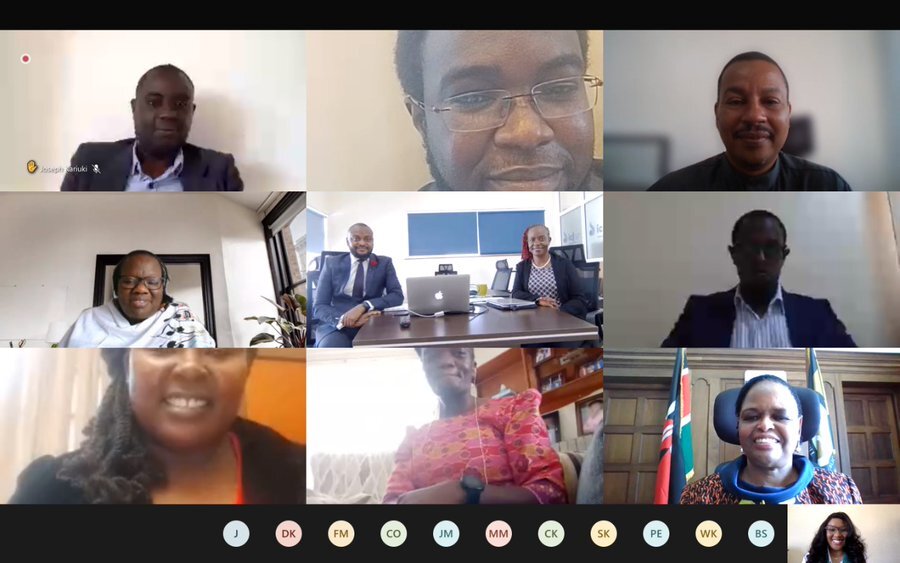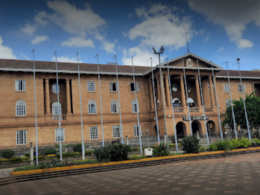By Susan Kendi
A section of Civil Society Organizations (CSOs) held a virtual meeting with the Chief Justice and President of the Supreme Court, Hon. Lady Justice Martha Koome, on Friday September 17, 2021, to discuss areas of collaboration and contribution.
The meeting was attended by the Kenyan Section of the International Commission of Jurists (ICJ Kenya), International Justice Mission Kenya (IJM Kenya), Kenya Human Rights Commission (KHRC), Amnesty International Kenya, Wangu Kanja Foundation, CREAW, and Transparency International – Kenya.
The organisations raised eight issues and proposals: the transfer and promotion of judges and related adverse effects on part-heard matters; capacity building and modalities for engaging with the Judiciary Training Institute (JTI); the need to have representatives of Community Justice Centers in Court User Committees to further enhance access to justice for vulnerable communities; Case backlog, the CSOs emphasized on strategies to expedite the hearing and determination of Anti-Corruption and Economic Crimes (ACEC) cases and also raised concerns over rising cases of gender-based violence, sexual offences, police abuse of power, extrajudicial killings, and enforced disappearances as we head into an election year.
Additionally,the CSOs agreed to support to the Judiciary in conducting public awareness campaigns on the Judiciary e-filing system by using various forms of media to sensitise users of the system on its functions; expressed concerns over increasing threats and attacks on the Judiciary and judicial officers and promised to offer support to counteract the attacks and strengthen judicial independence, especially in light of the 2022 general election.
A daily prior to the meeting, the Chief Justice and President of the Supreme Court of Kenya, Justice Martha Koome, launched the roadmap for the future of the Judiciary alongside the Performance Management and Measurement Understandings (PMMU) Evaluation Report 2019/2020.
The vision is founded on five guiding principles: Accessibility and Efficiency; Transparency and Accountability; Inclusiveness and Shared Leadership; Cooperative Dialogue, and Social Justice.
Speaking at the Supreme Court Building on September 16, 2021, CJ Koome said that her vision for the Kenyan Judiciary was deliberate: a path of societal transformation, change and accountability for results, what she terms as ‘Social Transformation through Access to Justice (STAJ).’
“The Judiciary will take charge of all matters filed in court. The next decade will phase out phrases like adjournment or stood over generally among other case backlog enabling vocabularies and actions,” said Chief Justice Koome.
The Chief Justice highlighted that no court case should drag in Judicial corridors. A case in a trial court should not last more than three years and a year in an Appellate Court.
Speaking on Access to Justice, the Chief Justice said that the Judiciary will always strive to be a world-class institution with effective structures, norms, and systems that position it as an engine for societal transformation envisioned in Constitution.
“We will strive to remove barriers to access to justice and ensure all persons, including vulnerable, are enabled to seek and obtain redress for grievances through formal and informal institutions of justice in compliance with human rights standards,” said CJ Koome.
Reading the performance results, CJ Koome mentioned that they had been categorized based on Courts and number of filed cases.
The best performing High Court stations in Kenya were Makueni, Milimani Civil Division, and Nakuru High Court. In the Employment and Labour relations Courts, Kisumu and Nakuru were leading in performance.
Murang’a, Milimani, and Nakuru Courts were the best-performing stations in the Environment and Land Court category.
The six best performing Magistrate Courts were Limuru, Marsabit, Mombasa Magistrates Court, Engineer, Tononoka Children’s Court, and Gatundu Magistrates Courts, whereas, on the performance of Kadhis Courts, Garissa and Voi emerged as the top performers.
In the tribunals’ category, the best performing was the Cooperative and the National Environment Tribunals.
Drawing to a conclusion, she announced the category of the best performing administrative units. The best performers were the Office of the Chief Registrar of the Judiciary, Office of the Registrar of Environment and Land Court, Director Supply Chain Management, and The Judiciary Training Unit.
Earlier in the day, Deputy Chief Justice Philomena Mwilu spoke, emphasizing that the vision being launched was not solely the Chief Justice’s Vision but the Judiciary’s collective and shared vision.
“The evaluation report her Ladyship is launching today provides a scorecard of the commitments and targets by the courts including the determination of cases within specified time frames, trial date certainty, case clearance rate, backlog reduction, and timely delivery of rulings and judgments,” said Deputy Chief Justice Mwilu.
The Evaluation Report documents the hard work, effort, and commitment of Judges, Judicial Officers, and judiciary staff across the institution during the fifth cycle of performance management and management understandings from June 2019 to June 2020.
“We urge the public, court users, institutional actors to robustly interrogate this important PMMU Report and engage with the Judiciary on its contents. We cannot improve alone; we require your constructive feedback, constructive advice,” added DCJ Philomena Mwilu.
The Chairperson Performance Management Committee, Justice Agnes Murgor, also spoke at the launch.
“The PMMU recommendations will empower courts and individuals to gauge performance against both their peers and themselves with the sole purpose of raising the standards and quality of services.,” she said.
The Chairperson Senior Counsel Bar, Dr. Fred Ojiambo, Judicial Service Commission Commissioner Justice David Majanja, Professor Margaret Kamar, Chief Registrar Anne Amadi, Caroline Saroni on behalf of Attorney General Kihara Kariuki and Jenniffer Shamala on behalf of the Justice and Legal Affairs Committee Chairperson Muturi Kigano, also gave their remarks at the launch.
JOINT COMMUNIQUE










